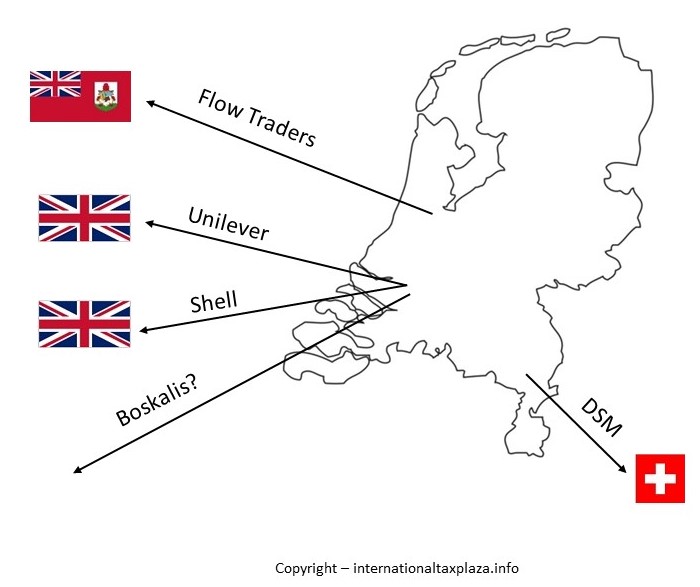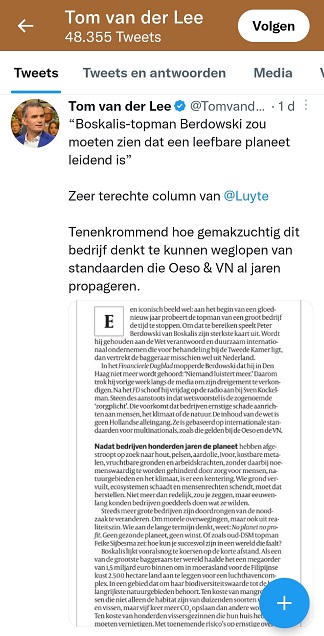What do companies like Unilever, DSM, Shell, Flow Traders and Boskalis have in common? All of them either already have moved their headquarters from the Netherlands to a country outside the EU, have decided to do so, or are considering to do so.
A quick look at these five companies
Unilever
In June 2020 the shareholders of Unilever decided to restructure Unilever’s holding structure in such a way that instead of having two headquarters (one in London and one in the Netherlands) in the future the company would have only one headquarter that would be located in London. The restructuring of the holding structure was completed in November 2020. Since then the global headquarter of Unilever and therewith the tax residency of Unilever’s top holding is located in London.
Shell
On December 10, 2021 the shareholders of Shell decided to simplify the company’s structure in such a way that instead of having two headquarters (one in London and one in the Netherlands) in the future the company would have only one headquarter that would be located in London. The restructuring of the holding structure was completed as per the end of 2021/the beginning of 2022. Since then the global headquarter of Shell, and therewith the tax residency of Shell’s top holding, is located in London.
DSM
In May 2022 DSM announced its intention to merge with the Swiss based company Firmenich. DSM stated that the company DSM-Firmenich will officially be a Swiss company, but that it will have 2 headquarters. One headquarter in the Netherlands and a second headquarter in Switzerland. However, it is DSM-Firmenich’s intention that the tax residency of the new group’s top holding will be Switzerland. (An Extraordinary General Meeting (DSM) on the intended merger will be held on January 23, 2023)
Flow Traders
On October 21, 2022 Flow Traders (a market maker) announced its intention to incorporate a new top holding company that will be based in Bermuda. The reason for the restructuring seems to be that Flow Traders wants to grow but that it feels hampered by regulatory requirements in Europe. According to the company the new group structure will not have any impact on the company’s operational activities and the places were Flow Traders will pay its taxes.
Boskalis
On January 6, 2023 Peter Berdowski, CEO of Boskalis (a Dutch based dredger), was interviewed during a Dutch radio program (Sven Op 1). During the interview Boskalis’ CEO stated that there is a substantial chance that Boskalis will also leave the Netherlands.
According to Berdowski the business climate in the Netherlands has deteriorated. That is in a number of elements. Particularly in the new International Corporate Social Responsibility Act. Berdowski states that Boskalis is not against corporate responsibility. Nor is it against sustainability. But as a company Boskalis is given a duty of care that it cannot meet. And according to the Boskalis’ CEO it will be difficult for Boskalis to continue to carry out its international activities under the aforementioned Act.
According to Berdowski currently large companies are being ostracized in the Netherlands. He states that nobody in the government was willing to talk to him when he wanted to express his concerns. Not the responsible minister, nor the prime minister.
Berdowski states that as a CEO he has the responsibility to think about what is the best location for the company. According to him until now that has always been the Netherlands, but Boskalis is now taking a serious look at that. He states that the flag is at half-mast, but it has not yet been lowered. In other words the decision can still go both ways.

Why do large enterprises move their HQ out of the Netherlands?
With respect to Unilever and Shell one of the reasons, if not the main reason, for why they decided to move their headquarter seems that they want to move the tax residency of their ultimate parent entity to the UK. And the reason therefore is that contrary to the UK the Netherlands has a dividend withholding tax. As we reported in an earlier article certain political parties had the intention to abolish the Dutch dividend withholding tax. However, left wing parties started a campaign in the media in which they stated that an abolishment of the dividend withholding tax would be another gift to large enterprises. As a reaction to the relocation of the ultimate parent entities of Unilever and Shell the leftwing party GroenLinks again pled for a new exit levy that would keep large enterprises from moving the tax residency of their headquarters out of the Netherlands.
For as far as I am aware DSM did not publicly comment on its reasons for why it chose for the structure it did. With old DSM shareholders getting 2/3 of the shares in the new ultimate parent entity feeling wise it would be more logic that the new ultimate parent entity would be a (tax) resident of the Netherlands.
As stated above Flow Traders is a relatively young market maker that wants to grow and that is of the opinion that the growth aspirations are hampered by European regulatory requirements. According to Flow Traders therefore it wants to move its ultimate parent entity to a location outside the EU. In this case Bermuda.
Whereas the Boskalis CEO feels that a new Act that on International Corporate Social Responsibility might force it to relocate its headquarter outside of the Netherlands. As far as I understand the new Act contains provisions based on which a director of a Dutch entity might have to go to jail if a non-related third party business partner might act in a way that is not in line with the conditions as laid down in the Act.
Conclusion: the official reasons that companies give for moving the (tax) residency of their ultimate parent entities out of the Netherlands are diverse. However, they are a clear indication that over the last few years the reputation of the Netherlands has changed from being an attractive place to do business into a place which is much less attractive to do business in.
How did the Netherlands get in this position
The influence of politicians
When the worldwide discussions regarding tax avoidance started, Dutch politicians like Paul Tang (PvdA) and Jesse Klaver (GroenLinks) immediately jumped on the bandwagon and started to get a lot of media attention with slogans like: large enterprises are parasites: they pay almost no taxes in the Netherlands, but they profit from all things we as a society invest in (good education of future employees, great infrastructure, etc.); the Netherlands is a tax paradise for multinationals; with one push of a button multinationals move their profits to low a taxed jurisdiction; the Netherlands levies no taxes over royalties; you as a citizen have to pay taxes in accordance with the law, but large enterprises can make secret deals with the tax authorities as a result of which they pay very little or even no taxes; etc. Together with NGOs like OXFAM-Novib, the Tax Justice Network these leftwing politicians got a lot of attention in the Dutch media. This resulted in a major change in the attitude that a considerable group of Dutch citizens has towards large enterprises.
As a result of this change, and I guess because the fear for a loss of electorate, also the larger moderate Dutch political parties like the D66, VVD and CDA made a swing to the left. Not only with respect to the tax treatment of multinationals, but also with respect to their point of views regarding climate change. Instead of bringing more nuance in the discussion, they first kept quiet and then started promoting themselves by pointing out the progress that in the area of combatting tax avoidance that was made under their leadership. And where the leftwing politicians in the parliament kept raising questions regarding the tax positions of individual large enterprises, the subsequent Secretaries of State for Finances kept repeating their standard answer: “I am sorry due to the secrecy I am bound to, I am not allowed to discuss the tax position of an individual taxpayer”, which only seemed to feed the suspicion that large enterprises paid far too little taxes.
Not unexpectedly large enterprises now seem to have concluded that both this swing to the left in the general politics, as well as the change in attitude that the general public has towards large enterprises, has decreased the attractiveness of the Netherlands as a place of residency.

Large enterprises and their advisors
Are leftwing politicians and NGOs solely to blame for the fact that the Netherlands is losing its attractiveness for large enterprises (and perhaps even also for mid-sized and small enterprises)? In my view the blame partly also lays with the large enterprises themselves, the advisors of such large enterprises as well as with the more moderate political parties.
In my view the initial catalyst for a change in attitude towards large enterprises was the Starbucks case. I still remember that Dutch media reported that it had come to light that Starbucks was avoiding taxes by using a Dutch shell entity and it had concluded a secret ruling with the Dutch tax authorities. This triggered my professional curiosity and I looked up what the address of the shell company was and where it was registered. Via a simple search I found out that on the same address several other Starbucks’ entities, including a coffee roasting company, were registered. A quick look on Google maps showed me how huge this Starbucks location in Amsterdam was. I can still vividly remember telling my girlfriend: “If this is a mailbox firm, then it is the biggest mailbox in the Netherlands.”
Whereas as I stated above leftwing politicians immediately jumped on the bandwagon when the Starbucks discussion started, the large enterprises themselves and their advisors seemed to duck out to avoid any attention. And the few times they appeared in the media they did not really shine. One of my ex-colleagues once appeared in the biggest talk show of the Netherlands. He was invited to have a discussion with a leftwing politician. And where the politician perfectly knew how to make a show, my ex-colleague countered every remark from his discussion partner with the answer that large enterprises fully acted within the borders of the law.
The Starbucks news was quickly followed by the FIAT, Google and Apple cases. Cases that caught a lot of media attention in The Netherlands. Each of these cases gave leftwing politicians a perfect pass to score. Media reports were short and simple. The European Commission started a case against so and so for avoiding taxes. And for doing so they all received illegal states aid. Obviously, especially the Starbucks case, where the European Commission accused the Netherlands of giving illegal state aid to Starbucks, got a lot of media attention in the Netherlands. And the attention was fairly one-sided. Little by little many people in Dutch society start to lose their sympathy for the large enterprises.
So where were the large enterprises and their tax specialists in all of this? That is a question I have asked myself a lot over the last few years. Where were we? Obviously the tax specialists have had a lot with their peers.But somehow we never reached, or never tried to reach the general public. And actually we should have seen the attitude to large enterprises change little by little. Not only in the area of taxes, but also in other areas. And when discussion arose in areas as for example the impact large enterprises have on the environment parties to the discussion dragged the matter of tax avoidance into the discussion to show how selfish enterprises were. Their attitude towards taxes shows that for the large enterprises its all about shareholder value, they don’t care about anything else.
More moderate political parties
Where I can understand that the large enterprises and their advisors did not seek too much attention I have more problems with explaining to myself why the larger more moderate parties remained silent. Where the large enterprises might get the reproach that they would be defending their own interest if they would have tried to bring more nuance in the discussions, in my view this would be different for the more moderate political parties. All political parties are supposed to act in the interest of a country. However as stated above in this case the more moderate political parties remained silent. Very silent and therewith gave the left wing parties a podium where they were able to influence the opinion of the general public, without anybody bringing more nuances in the discussion. And once they realized how large part of society sympathized with the opinions of the leftwing parties more moderate parties also tried to get on the train by stating how they were the leaders in the combat against tax evasion. Probably not realizing, or not willing to realize that little by little the Dutch business climate was deteriorating.
What will the future bring?
More and more it seems to become clear that by now the signals for the Dutch business climate have slowly turned dark red. So the question I have been thinking a lot about lately is whether there will be change in policy? Although I certainly hope so, I start to become more and more afraid that this will prove to be false hope. With the Dutch Prime Minister recently stating that the Netherlands and the Dutch business climate is a magnet for large multinationals.
And the remarks that the GroenLinks Member of Parliament Tom van de Lee placed on his twitter account do not seem to indicate that leftwing parties have already recognized the damage their attitude towards large enterprises has done to the Dutch business climate. (“Boskalis CEO Berdowski should see that a livable planet is leading” and “It's cringing to see how easy this company thinks it can walk away from standards that the OECD & the UN have been propagating for years”)
So let’s hope that the Dutch politicians get some sense before the signals for the Dutch business climate change from dark red to pitch-black.

Copyright – internationaltaxplaza.info
Follow International Tax Plaza on Twitter (@IntTaxPlaza)
